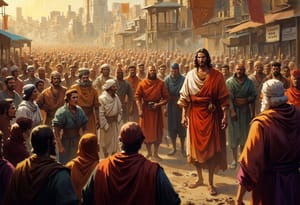| Series | Gospel of Luke (4) |
|---|---|
| Theme | 2. Seek God’s good gifts - 2. SA’ILI MEAALOFA A LE ATUA |
| Colour | Lanu Efuefu |
Scripture Focus: Luka 20:1-26
On one of those days, as he was teaching the people in the temple and preaching the Good News, the priests and scribes came to him with the elders. They asked him, “Tell us: by what authority do you do these things? Or who is giving you this authority?” He answered them, “I also will ask you one question. Tell me: the baptism of John, was it from heaven, or from men?” They reasoned with themselves, saying, “If we say, ‘From heaven,’ he will say, ‘Why didn’t you believe him?’ But if we say, ‘From men,’ all the people will stone us, for they are persuaded that John was a prophet.” They answered that they didn’t know where it was from. Jesus said to them, “Neither will I tell you by what authority I do these things.” He began to tell the people this parable. “A man planted a vineyard, and rented it out to some farmers, and went into another country for a long time. At the proper season, he sent a servant to the farmers to collect his share of the fruit of the vineyard. But the farmers beat him, and sent him away empty. He sent yet another servant, and they also beat him, and treated him shamefully, and sent him away empty. He sent yet a third, and they also wounded him, and threw him out. The lord of the vineyard said, ‘What shall I do? I will send my beloved son. It may be that seeing him, they will respect him.’ “But when the farmers saw him, they reasoned among themselves, saying, ‘This is the heir. Come, let’s kill him, that the inheritance may be ours.’ They threw him out of the vineyard, and killed him. What therefore will the lord of the vineyard do to them? He will come and destroy these farmers, and will give the vineyard to others.” When they heard it, they said, “May it never be!” But he looked at them, and said, “Then what is this that is written, ‘The stone which the builders rejected, the same was made the chief cornerstone?’ Everyone who falls on that stone will be broken to pieces, but it will crush whomever it falls on to dust.” The chief priests and the scribes sought to lay hands on him that very hour, but they feared the people—for they knew he had spoken this parable against them. They watched him, and sent out spies, who pretended to be righteous, that they might trap him in something he said, so as to deliver him up to the power and authority of the governor. They asked him, “Teacher, we know that you say and teach what is right, and aren’t partial to anyone, but truly teach the way of God. Is it lawful for us to pay taxes to Caesar, or not?” But he perceived their craftiness, and said to them, “Why do you test me? Show me a denarius. Whose image and inscription are on it?” They answered, “Caesar’s.” He said to them, “Then give to Caesar the things that are Caesar’s, and to God the things that are God’s.” They weren’t able to trap him in his words before the people. They marveled at his answer, and were silent.
- Luke 20:1-26 (WEB)
Study:
The Parable of the Tenants reveals a powerful lesson on responsibility, stewardship, and rejection. Jesus tells of a man who plants a vineyard and rents it to tenants, expecting a share of the fruits at harvest time. The tenants, however, refuse to give their due; instead, they beat and even kill the servants sent to collect. Finally, the owner sends his beloved son, hoping they will respect him, but the tenants kill him to seize the inheritance. This parable demonstrates how God entrusted the care of His people to the leaders of Israel, yet they rejected His messengers and even His Son. Jesus warns of the consequences of rejecting God's authority and highlights the cornerstone role His Son plays in God's kingdom.
Application:
Today, this parable calls us to examine our own stewardship of what God has entrusted to us, whether it be gifts, talents, or responsibilities. It challenges leaders and believers alike to recognize and honor God's authority in their lives. Like the tenants, we can be tempted to reject God's guidance or mistreat His messengers, but God desires faithful stewardship and reverence. Jesus' words also remind us that ultimate authority belongs to God, and we are to give to Him what is His, living lives that reflect His kingdom values in every aspect.
Reflection Questions:
- How do I respond to God’s authority in my life?
- In what ways am I faithfully stewarding God’s gifts and responsibilities?
- Am I, like the tenants, resisting or rejecting God’s messengers or guidance?
- How does Jesus, the cornerstone, shape my daily decisions and relationships?
- What practical steps can I take to honor God with what He has entrusted to me?
Prayer:
Lord God, help us to recognize Your authority in every area of our lives. Teach us to be faithful stewards of all You entrust to us and to honor Your Son, the cornerstone of our faith. May we respond with obedience, reverence, and love, giving You what is rightly Yours. Guide us to live lives pleasing in Your sight and reflect Your kingdom here on earth. In Jesus' name, Amen.
Tags:Parable of the Tenants, Stewardship, Jesus Authority, Gospel of Luke, Bible Study, Christian Living, Faithfulness, God's Kingdom, Jesus the Cornerstone, Rejection of Jesus
